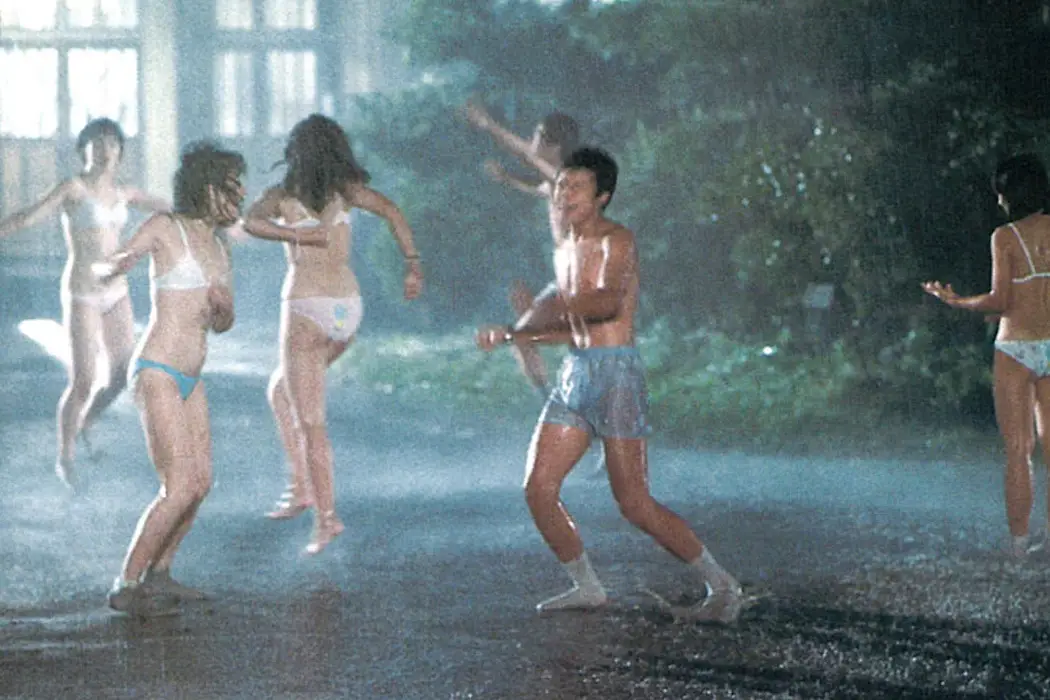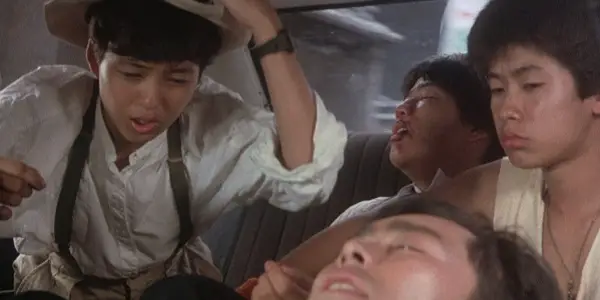Rebel Yell: Shinji Somai’s P.P. RIDER & TYPHOON CLUB

Lee Jutton has directed short films starring a killer toaster,…
In Japan, filmmakers and film fans have long preached the gospel of Shinji Somai, the director whose energetic, innovative experiments in the seishun eiga (youth film) genre helped define Japanese cinema in the 1980s. Though he tragically passed away in 2001 at the age of only 53, Somai’s films have lived on in his stead, with acclaimed directors like Ryusuke Hamaguchi and Kiyoshi Kurosawa continuing to pay homage to his work and film magazine Kinema Junpo consistently ranking his films among the greatest of all time. Yet his work remains largely unknown in the Western hemisphere, falling as it did in a period of time between the dual heights of the midcentury Japanese studio system and the independent cinema of today — periods that attract far more attention from critics and fans on this side of the world than the era in which Somai did his best work.
Following a first-ever U.S. retrospective of Somai‘s work held by the Japan Society in New York in April and May, Cinema Guild is now bringing two of the director’s signature films—the chaotic farce P.P. Rider and the melancholic drama Typhoon Club—back to cinemas to be rediscovered by American audiences. Both P.P. Rider and Typhoon Club showcase many aspects of Somai’s signature style: long takes making liberal use of camera movement and cranes, raw performances from ensembles of mostly amateur actors, and—perhaps most importantly—storylines centered on the violence that runs like an undercurrent through one’s youth. In the cinema of Shinji Somai, much as in real life, being young hurts, but unlike many Hollywood coming-of-age films such as The Breakfast Club, there is little to no glamorization of that pain. Indeed, if one is to compare Somai to anyone from the West, the French New Wave would make more sense—especially in films like The 400 Blows where, as one looks beyond youth to one’s adulthood, one wonders whether it would be better to throw it all away rather than face the disillusionment of growing up.
P.P. Rider (1983)
Based on a story by Leonard Schrader, the premise of P.P. Rider, Somai’s third feature—following his 1980 debut feature Tonda Couple and the 1982 cult classic Sailor Suit and Machine Gun—is the very definition of a wild ride. After school bully Nobunaga (Yoshikazu Suzuki) is kidnapped by the yakuza, three of his classmates—Jojo (Masatoshi Nagase), Jisho (Shinobu Sakagami), and the totally cool tomboy known as Bruce (Michiko Kawai)—decide to rescue him. Their motivations, however, are not entirely altruistic: “We have to get revenge on him before he is killed,” they declare. After all, who are the yakuza to harm Nobunaga before they can do it themselves?
The kidnapping itself is a bit of a mess, a “kidnap overlap” involving two rival syndicates. One has accidentally kidnapped the wrong kid, thinking his dad is the loan shark to whom they owe money; the other knows Nobunaga’s dad runs a pharmacy and wants to utilize his business in the drug trade. Armed with the adventurous spirit and unabashed courage that comes with the naivety of youth, our trio of young heroes embark on a madcap escapade that takes them across the country, tangling with adults of various degrees of ineptitude. (The most inept? The cops, obviously.) Along the way, they enlist the help of a washed-up gangster known as Gonbei (Tatsuya Fuji, best known for his leading role in In the Realm of the Senses) and their old teacher, Miss Arare (Hideko Hara), though neither adult manages to fully live up to the confidence the kids have placed in them.
Many aspects of P.P. Rider aren’t dissimilar from other 1980s youth (mis)adventure films, such as The Goonies (including but not limited to the plethora of fat jokes directed at Nobunaga by kids and adults alike). But whereas The Goonies feels safely situated in a realm of fantasy involving treasure maps and legendary pirates where one is secure in the knowledge that it will all turn out okay in the end, the gritty and grimy world of P.P. Rider feels much more grounded in reality. The violence of P.P. Rider is real and dangerous; coming face to face with it forces the kids to realize that their pursuit of Nobunaga is no mere game and that the adult world isn’t one to tangle with prematurely.

The film’s climax at the local kindergarten, a scene of blood and drugs and a stunning singalong complete with synchronized dance moves, epitomizes the clash between youth and adulthood that runs through Somai’s work—particularly the crushing disappointment that occurs when you realize the adults in your life are not the figures of adulation that you initially believed. After all, growing up doesn’t make you magically get your act together; many adults are just as messed up and confused as children. As the kids belt out their song, one is filled with a strange sense of desperation; they seem to be clinging to what remains of their innocence against all odds, even as guns fire and heroin swirls in the air around them.
P.P. Rider is often confusing and never anything less than utterly chaotic, with the plot jumping around abruptly as the kids race from place to place; their movements are captured by a camera that is in almost perpetual motion, echoing their anarchic energy. Anyone who has ever seized the freedom of summer to get into all kinds of mischief before school sets in again will find aspects of these shenanigans relatable—even if, you know, you never fired a gun at a fleeing yakuza or exploded bags of drugs in the air like fireworks. Speaking of fireworks: there is one particularly beautiful scene in P.P. Rider in which the kids battle gangsters in an apartment at night while fireworks explode outside the window. I’m still not entirely sure how they got there or why, but it was stunning. Then again, I’m still not entirely sure how or why anything happened in P.P. Rider. All I know is that I thoroughly enjoyed it.
Typhoon Club (1985)
Somai’s sixth film chronicles five days in the lives of a group of junior high school students as a typhoon bears down on their small town; on the night of the storm, six of them end up stranded inside their school, while another who has run away to Tokyo for a weekend of freedom finds herself unable to get home. In both situations, the adults these kids turn to for assistance fall short of expectations, leaving them to fend for themselves in a frightening world that verges on the apocalyptic. As the night progresses in a maelstrom of driving rain and howling wind, at least one of the kids finds himself wondering: Is it better to die young than to face the inevitable disenchantment of adulthood?
The kids of Typhoon Club engage in all of the usual experiments of youth, including skipping class and sexual activity with both the same and the opposite sex. But there are other, darker things lurking beneath the surface of their lives. One of the students, the introspective and intellectual Mikami (Yuichi Mikami), wrestles with questions that have no easy answers, including: “How does one rise above one’s species?” Another one of the students, Ken (Shigeru Benibayashi), is constantly rehearsing a return home out loud—“I’m home / Welcome home”—in a way that signifies some deep, underlying trauma; he later on channels this energy into the attempted rape of a classmate that night in the school, compulsively repeating his refrain as he kicks in the door behind which she is hiding. Portrayed with all of the matter-of-fact ugliness that such violent acts deserve, these scenes feel straight out of a horror film.
The fear of sexual violence inflicted by men upon women hovers like a menace over Typhoon Club; in addition to Ken’s attempt at assault, runaway Rie (Youki Kudoh) is picked up by an older man in Tokyo who wants her to stay the night; his attitude evolves from friendly to menacing as it becomes clear that Rie isn’t looking to sleep with him. Eventually, she flees his flat into the night; unable to get a train home due to landslides in the area, she ends up walking alone in the rain and the dark, sobbing as she sings out loud to herself in an attempt to keep her spirits up. Another male student commits a sudden violent act towards the girl who is the object of his affection, leaving her with what might be permanent scars on her back. And in the film’s opening scenes, a boy who is spying on his female classmates in the swimming pool ends up nearly drowning when the girls decide to punish him for invading their privacy. This growing tension between the genders is one of the quintessential signifiers that the innocence of youth is fading away, all too soon to be forgotten.

The main adult in the world of Typhoon Club is the students’ 32-year-old math teacher, Umemiya (Tomokazu Miura). He has a cheerfully antagonistic, teasing relationship with his students until one day his girlfriend’s sister storms in, humiliating him in front of the class and demanding he propose marriage. In one fell swoop, the class’ idealistic image of their teacher is cracked; it fully shatters when Mikami calls Umemiya from the school, asking the teacher to help the stranded students get home. Drunk and in the middle of partying with friends, Umemiya is absolutely useless; when Mikami voices his disappointment and anger, Umemiya shoots back, “Fifteen years from now, you’re going to be like I am now.” Mikami refuses to accept this—“I’ll never be like you”—yet this existential fear hovers over him for the rest of the night. If that is really all that the future has in store for him and his peers, is the future even worth their while?
Screening in a new 4K restoration that emphasizes the film’s beautiful color palette of cool blues, fertile greens, rich blacks, and bright whites, Typhoon Club looks as haunting as it feels. Somai’s camera remains active, tracking slowly through the darkness of an empty auditorium as Mikami sits on the floor alone, watching as his compatriots frolic on stage. As he meditates on the meaning of his call with Umemiya, the other students luxuriate in a borderline-utopian atmosphere that they know will inevitably come to an end as soon as the tempestuous weather comes to a stop. Stripped down to their underwear—all clean and virginal white—they sing and dance and even go outside during the temporary quiet of the storm’s eye to splash in the puddles left behind, seizing one last moment of youthful freedom away from the adults in their lives.
But there’s no happy ending that comes with the sunrise; instead, the night culminates in a tragedy that ensures they’ll never experience these feelings the same way again. As they venture outside into the sea of mud left behind by the storm, it feels as though they are venturing out into the adult world for the very first time, and seeing how, by the light of day, there’s nothing special about it. Whereas most coming-of-age films end on a note of positivity and hope for the future, Typhoon Club leaves one feeling despondent about what’s coming next; one cannot even have the satisfaction of a dignified death without ending up face down in the muck. It might sound unpleasant, but it’s Somai’s unflinching depiction of such unpleasantness—such unhappiness—that makes Typhoon Club such a powerful portrayal of youthful disconnect.
P.P. Rider and Typhoon Club open at the IFC Center in New York on September 8, 2023 before expanding nationwide.
Does content like this matter to you?
Become a Member and support film journalism. Unlock access to all of Film Inquiry`s great articles. Join a community of like-minded readers who are passionate about cinema - get access to our private members Network, give back to independent filmmakers, and more.
Lee Jutton has directed short films starring a killer toaster, a killer Christmas tree, and a not-killer leopard. Her writing has appeared in publications such as Film School Rejects, Bitch: A Feminist Response to Pop Culture, Bitch Flicks, TV Fanatic, and Just Press Play. When not watching, making, or writing about films, she can usually be found on Twitter obsessing over soccer, BTS, and her cat.













